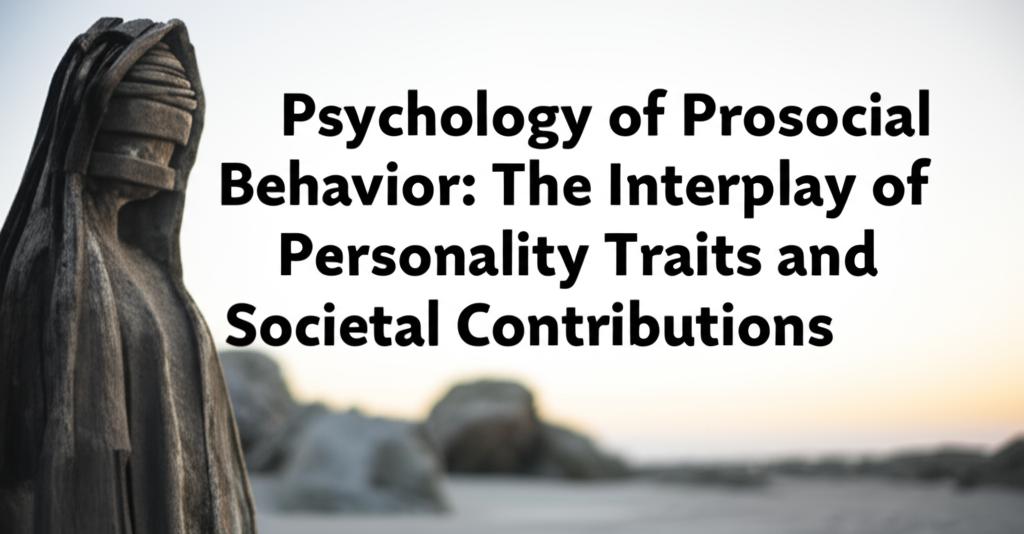The willingness of individuals to engage in actions that benefit others, known as prosocial behavior, is a cornerstone of a well-functioning society. Recent psychological research continues to unravel the complex interplay between our inherent personality traits and ourpropensity to contribute to the common good through acts like volunteering, charitable giving, and everyday kindness. Understanding this dynamic can offer valuable insights for fostering a more compassionate and cooperative society.
The Big Five and Philanthropic EngagementA significant body of research, including a recent large-scale analysis of over 29 international studies involving more than 90,000 participants, has focused on the relationship between the "Big Five" personality traits—openness, conscientiousness, extraversion, agreeableness, and neuroticism—and prosocial actions. Findings highlight that certain traits are more strongly linked to specific types of societal contributions.
Extraversion and Volunteering: Individuals high in extraversion, characterized by sociability and assertiveness, tend to be more involved in volunteering. Their outgoing nature may make them more comfortable and inclined to engage in community activities that involve direct interaction with others. Agreeableness and Charitable Giving: Agreeableness, which encompasses traits like compassion and a tendency to consider others' feelings, shows a stronger correlation with monetary donations to charitable causes. Agreeable individuals may be more moved by empathy to provide financial support.Interestingly, the research yielded mixed results for other traits. Conscientiousness, openness, and neuroticism appeared to have a less consistent or weaker direct effect on these forms of philanthropic engagement. These findings underscore that different facets of personality can drive different forms of helping behavior.
Beyond the Big Five: Other Influencing FactorsWhile the Big Five provide a foundational framework, other psychological elements also play crucial roles:
- Empathy and Moral Identity: Empathy, the ability to understand and share the feelings of others, is a strong motivator for prosocial acts, both online and offline. Moral identity, or the degree to which being a moral person is important to an individual's sense of self, also significantly influences the likelihood of engaging in helping behaviors.
- Social Self-Efficacy: This refers to an individual's belief in their ability to manage social relationships and navigate social situations effectively. Higher social self-efficacy can lead to greater engagement in prosocial behaviors, as individuals feel more capable of making a positive difference in their interactions.
- Public Self-Awareness: Recent studies suggest that actions taken to improve one's own appearance, whether physical or digital, can surprisingly boost prosocial behavior. This is thought to occur because such actions heighten public self-awareness, leading individuals to align their behavior more closely with socially desirable norms, including helping others.
- Relational Needs and Social Exclusion: Experiences of social exclusion can negatively impact prosocial behavior. The threat to one's relational needs (the need to belong and feel connected) can mediate this relationship. However, an individual's regulatory focus (whether they are more promotion-oriented, focusing on gains, or prevention-oriented, focusing on avoiding losses) can moderate how they respond prosocially after feeling excluded.
Engaging in prosocial behavior isn't just beneficial for the recipients and society at large; it also offers significant advantages for the giver. Studies show that prosocial acts contribute to increased well-being, positive emotions, and a greater sense of purpose and meaning in life. Furthermore, helping others can reduce feelings of loneliness and foster a sense of social inclusion by encouraging more social interactions. Even small, everyday acts of kindness, like greeting someone or checking in on a friend, can contribute to improved life satisfaction.
Implications for Fostering Societal ContributionsThe ongoing research into the psychology of prosocial behavior offers practical implications. By understanding the personality traits and psychological mechanisms that underpin helping behaviors, organizations and policymakers can develop more targeted strategies to encourage volunteering and charitable giving. For example, initiatives could be tailored to appeal to the motivations of extraverted individuals for volunteering opportunities that involve social interaction, while campaigns for charitable donations might emphasize empathetic narratives to resonate with agreeable individuals.
Moreover, fostering environments that enhance social connection, reduce social exclusion, and promote empathy from a young age can cultivate a more prosocial populace. Recognizing that even actions perceived as self-focused, like self-beautification, can indirectly promote prosocial tendencies by increasing self-awareness highlights the multifaceted nature of human motivation.
In conclusion, our personality traits are intrinsically linked to our inclination to contribute to society. While some individuals may be naturally more predisposed to certain types of prosocial actions, understanding the psychological drivers behind these behaviors, such as empathy, moral identity, and social self-efficacy, allows for the development of strategies to encourage and cultivate a culture of giving and cooperation, ultimately benefiting both individuals and the wider community.

